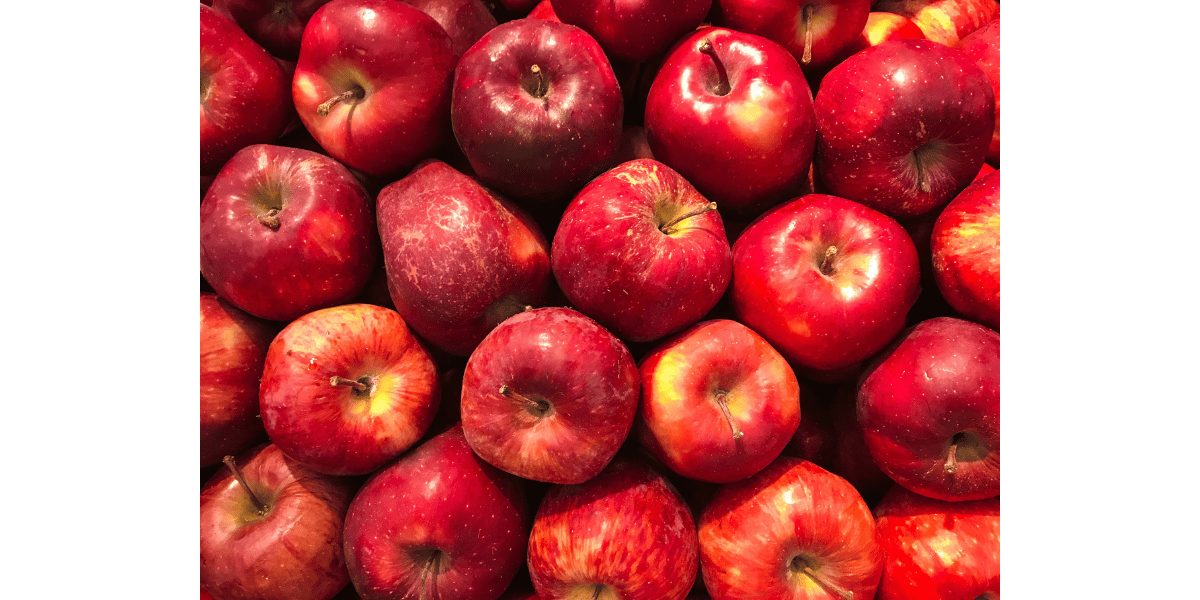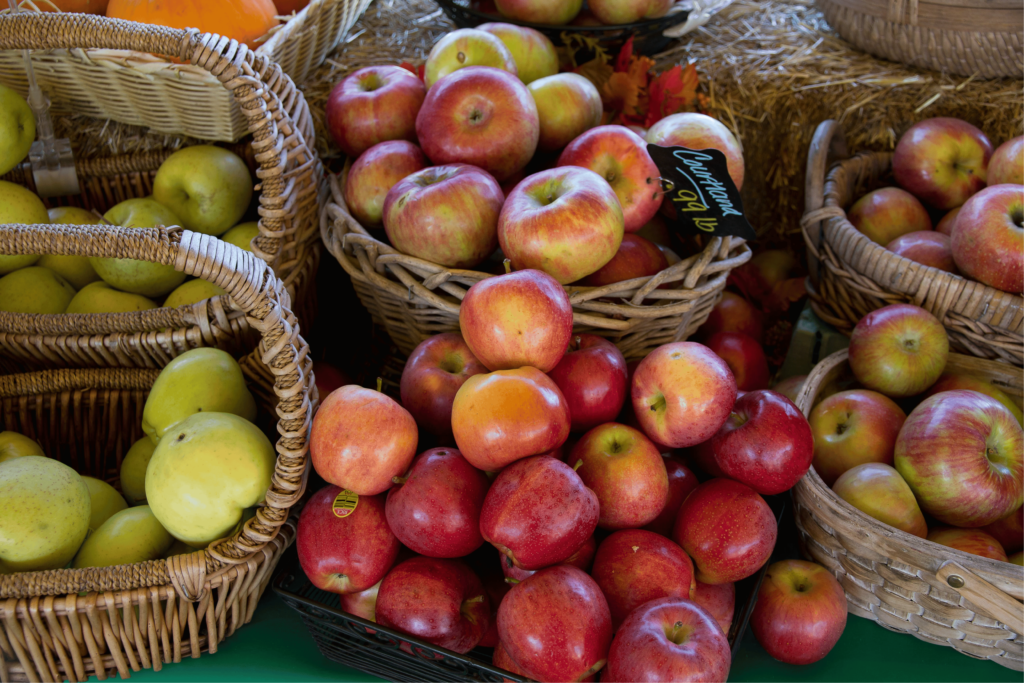Health Benefits of Eating Apples in South Africa

Explore with me the health benefits of eating apples in South Africa.
I’ll journey with you through different types of apples, their nutrition, and their health benefits.
From Top Red (my favourite), Golden Delicious to Granny Smith. These apples are a tasty and effortless way to add nutrients to your diet.
Where Did Apples Originate From?
Research indicates apples originated in the mountains of Kazakhstan, in Central Asia. Apples are members of Rosac.
The Rose family includes pears, cherries, strawberries, raspberries, plums, and peaches.
South Africa produces various apples for local consumption, including Golden Delicious, Royal Gala, Braeburn, and Granny Smith.
However, South Africa exports a variety of apples: Golden Delicious, Royal Gala, Granny Smith, Cripps Pink, Pink Lady®, Top Red, Starking, Fuji, Cripps’s Red, Joya®, and Braeburn. We get the leftovers from the export market.
Apples come in assorted colours depending on the variety, from pale yellow and green to deep red. Their taste and texture vary, too, from juicy to firm and sweet to tangy.
As a consistent fruit consumer, I buy apples from Woolworths, Pick n Pay, and Shoprite all year round.
But is eating apples healthy?
There are concerns about their high sugar content.
Also, their pesticide exposures and the production of genetically modified varieties.
So, how good are apples for you? Do their benefits outweigh any risks they may present?
Let us examine the apple types, their nutrition facts, and their benefits.
Type of Apples

More than 7,500 types of apples are available worldwide. However, South Africa has apples for export, especially in Northern Europe and the United Kingdom.
South Africa produced 856 6 thousand metric tons of fresh apples in 2018/19.
The most popular cultivated apple types in South Africa include:
Big Buks
Braeburn
Cripps Red
Cripps Pink
Early Red One
Fuji
Fuji Red
Gala
Golden Delicious
Granny Smith
Jazz
Kanzi
Kiku
Mahana Red
Pink Lady
Royal Gala
Starking
Sundowner
Top Red
Rare apples may also be black or purple on the outside, sometimes with red or pink flesh. They even taste like roses, lemons, or honey.
Furthermore, apples are expensive and are scarce in supermarkets. The Tibetan Black Diamond apple is dark purple and grows in remote Tibet.
You will visit Tibet someday and enjoy this rare apple, or you can buy it from the exotic section of your supermarket fruit division.
Apple Nutrition
Do apples have any nutritional value?
All apple varieties contain beneficial nutrients. These nutrients include fibre, vitamin C, potassium, and various antioxidants. They also contain phytochemicals, including quercetin, catechin, and chlorogenic acid.
Additionally, the fibre found in apples is pectin. Pectin is a mixture of soluble and insoluble fibres. Soluble fibre helps feed the microbiome and also lowers high cholesterol. So, insoluble fibre helps keep your intestines clean and healthy.
They are a reliable source of simple natural sugars like glucose, fructose, and sucrose. Still, they have a low glycemic index (GI) of approximately thirty-six.
These fruits do not spike blood sugar much after eating. Their high fibre and polyphenol content help prevent glucose spikes. Fibre and polyphenols slow down how fast your body breaks down carbohydrates.
One small apple (100g) contains approximately:
- Energy 51 kcal/215 KJ
- Protein 0.6 g
- Fat 0.5 g
- Carbohydrates 11.6 g
- Fiber 2.5 g
- Potassium 100 mg
- Vitamin C 6 mg
But you may wonder whether eating an apple’s skin is safe. The apple peel and skin contain valuable nutritional components, so eating them washed and unpeeled is best.
Apple Health
The health benefits of eating apples are that they help in weight loss, are suitable for blood pressure and can help with constipation.
The following are the significant health benefits you can get by eating apples.
Apples Lower the Risk of Dementia and Protect Brain Health
Eating a fruit-rich diet like apples may help prevent Alzheimer’s Disease.
Include flavonoid-rich food in your diet to help your body reduce Alzheimer’s disease.
Reduce the Risk of Stroke
Additionally, apples have vital nutrients to help lower the risk of stroke.
Studies found that consuming the most fibre reduces the risk of heart-related disease and stroke.
Apples and High Cholesterol and Blood Pressure
Apples consist of pectin, a natural fibre found in plants. Therefore, its soluble fibre can help inhibit cholesterol buildup in the lining of blood vessels. And pectin also helps in lowering the incidence of atherosclerosis and cardiovascular disease.
Further research shows that eating apples or pears is associated with a fifty-two per cent lower stroke risk.
Heart Health and Eating Apples

Are apples heart-healthy?
Indeed, as you put your teeth on a juicy apple, this might be the question on your mind. Yes, they tend to lower the risk of heart health.
The primary reason may be that apples contain soluble fibre, which can help lower blood cholesterol levels.
Besides, apples are rich in polyphenols and protective plant compounds, one of which is a flavonoid called quercetin.
Research by the American Journal for Clinical Nutrition found that people with higher quercetin levels had a lower risk of heart diseases, including other non-communicable conditions.
Apples and Diabetes
It is incredible, considering how sweet apples are. Yet, a growing body of research suggests that eating apples may help lower blood sugar and protect against type 2 diabetes.
Also, the fibre and polyphenols in apples slow carbohydrate digestion, preventing spikes in blood sugar after eating.
Furthermore, a 2021 study found that people who consume whole fruits in their diet had a lower percentage risk of developing type 2 diabetes.
Lower the Risk of Cancer
Moreover, phytonutrients in apples have protective effects on cancer risk. Research suggests that apple polyphenolic compounds have antioxidant, anti-inflammatory, anti-proliferative, and apoptosis-inducing characteristics for cancer.
In October 2016, Public Health Nutrition published a review showing that eating apples reduces cancer risk. Cancer risks include colorectal, oral cavity, oesophageal, and breast cancers.
Besides, the fibre in apples may provide cancer-preventing properties.
Weight Loss and Eating Apples
They are low in calories and high in fibre, which can help you feel full and eat fewer calories throughout the day. A medium-sized apple contains four grams of fibre.
Researchers have proposed that including apples in a healthy, balanced diet may encourage weight loss.
Further, they are also rich in antioxidants such as catechins, chlorogenic acid, and fibres like quercetin. These antioxidants help regulate blood sugar levels, improve digestion, and lower cholesterol and triglyceride levels.
Do Apples Aid Digestion?
The School of Public Health, Harvard T. H. Chan contends that apples contain both types of fibre, soluble and insoluble. Both types of fibre are essential for digestion.
So, yes, apples are nutritious fruits that could help with digestion. They contain vitamins and minerals good for digestion, such as vitamin C and potassium.
They contain an excellent source of pectin, a non-starch polysaccharide that humans cannot digest. Besides, pectin provides food for colonic bacteria that convert it into beneficial short-chain fatty acids. These acids maintain the health of healthy gut bugs and the cells lining the colon.
Are Apples Good for Your Immune System?
Who has yet to see an array of medications to help build a more robust immune system at Dischem or Clicks?
Besides medication, apples can be valuable in your immune-supporting tool kit.
Vitamin C in apples is also known as ascorbic acid. This essential dietary nutrient has many vital functions in your body and is critical for boosting the immune system.
Apples are also a rich source of phytochemicals, like quercetin, which is known for its antioxidant and anti-inflammatory effects, which help regulate immune responses.
May Improve Lung Health and Asthma Symptoms
Eating fruits and vegetables has a positive influence on lung health.
Apples are good for lung health and asthma symptoms.
Potential Health Risks
Apple Seeds and Cyanide
These seeds contain amygdalin, a cyanide. Yet, the human body can detoxify cyanide when ingested in small doses.
Their flesh and peel do not have cyanide.
It will take chewing hundreds of apple seeds for anyone to get cyanide poisoning.
Contain a High Number of Pesticides
The Environmental Working Group (EWG) released its Dirty Dozen Guide to pesticides in produce. Apples always make the list. According to EWG, apples contain four pesticide residues, some in high concentration.
However, buying organic apples whenever possible is wise. Thus decreasing your concern about ingesting pesticides in apples.
Allergy and Apples
Some people have an allergy to the protein in apples. This allergy results from a reaction called oral allergy syndrome (OAS), which is common in many fresh produce.
Furthermore, a person may experience itchy lips and tongue. However, thoroughly washing and cooking apples will remove the culprit protein.
Apples are High In Sugar
Apples contain fructose like other fruits. However, the sugar content in an average apple is approximately 19 grams. Further, apples are low on the glycemic index.
Hence, it would be rare for apples to impact people with diabetes. Nonetheless, you must be vigilant when consuming apple juice as it contains high sugar.
Storage Tips for Apples
Understanding how to store apples is critical. Apples release a compound called ethylene gas, which hastens the ripening of other fruits and vegetables.
Store apples away from other fruits, usually on the countertop of your fridge.
If you are storing apples for a more extended period, your temperature range must be -1° C to 1.5° C.
Package small amounts of apples in perforated plastic bags or cover them with a damp paper towel.
The Best Way to Eat Apples
To enjoy your apples, understand their texture and choose how to eat them. Some apples have firmer skins, and others have thinner skins.
The way you use them depends entirely on the type of apple you use. Here are the uses of apples as per type:
- Gala: The Gala apple is sensitive to health. You can eat it raw or cut and tossed into fruit salads.
- Fuji: The Fuji apple is sturdy and can withstand baking and roasting, making it ideal for
- Crispin: Crispin is versatile and works well, baked in apple pies or made into applesauce.
- Granny Smith: This tart, high-acidity variety is tasty raw, or you can use it in pies, tarts, pancakes, soups, or stuffing.
Irrespective of what type of apples you eat, you can use them in various ways. Enjoy them.
Conclusion
A there any actions you’lll take afeter exporing the health benefits of eating apples?
They are a delicious addition to whole foods, plant-based diet.
Apples have properties that can have an impact on preventing chronic diseases.
One apple a day should be your mantra – enjoy your apples.

Well this article just convinced me to add apples in my diet, I will add in my green salad though, then I will enjoy it.